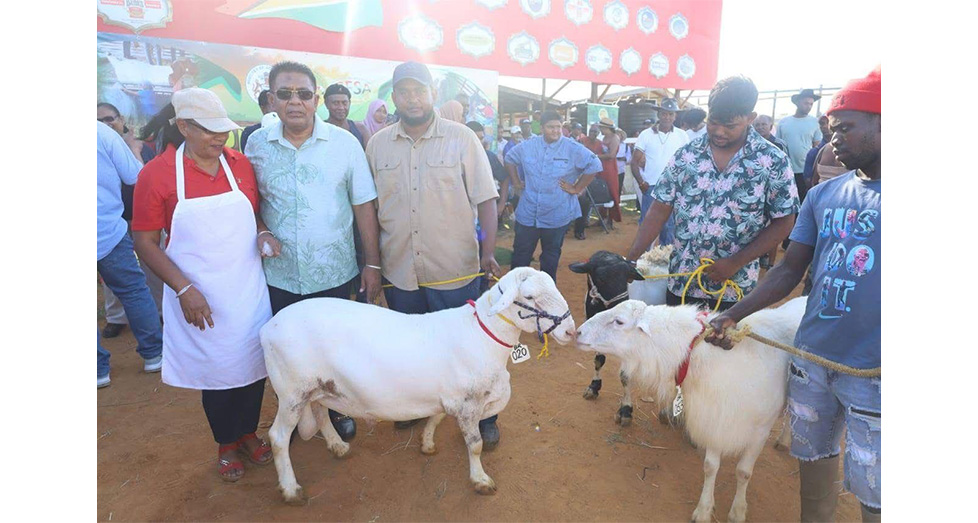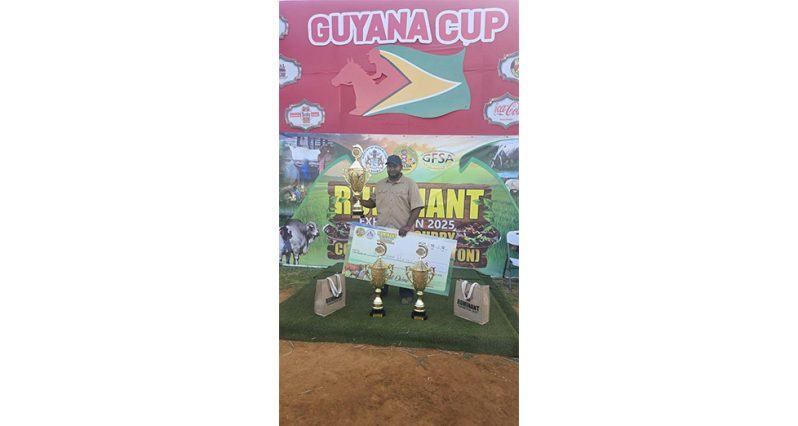AT just 29 years old, Alameen Hussain of Good Hope, East Bank Essequibo, has distinguished himself as one of Region Three’s most dynamic young livestock farmers.
Raised in a family of small ruminant farmers, Hussain developed an early passion for animal husbandry—one that has since evolved into a thriving and competitive sheep-rearing enterprise built on careful breed selection, innovation, and resilience.
Growing up, Hussain spent his afternoons assisting his father with the family’s poultry and small livestock, primarily turkeys and chickens. His own journey began when he was gifted two goats, but after challenges with their aggressive nature and neighbour complaints, he decided to shift to sheep rearing in 2012—a decision that transformed his livelihood.
“Sheep are easier to manage than goats,” Hussain explained. “I started with seven—a mix of Blackbelly and Texana breeds—and with the right care, that small flock grew into something much larger.”

Hussain’s decision to work with mixed breeds was a deliberate strategy to meet diverse market demands. The Blackbelly breed, known for its hardiness and adaptability, forms the foundation of his flock, while the Dorper breed was introduced for its superior meat quality and faster growth rate. The Texana and other purebred lines, meanwhile, are raised for breeding purposes and sold to other farmers seeking to improve their stock.
“The market demands variety,” Hussain noted. “Some butchers prefer the Dorper for its meat yield, while other farmers look for purebreds or crosses with specific traits. Having mixed breeds allows me to serve multiple markets—from breeding stock to meat production—which makes the business more sustainable and profitable.”
With sound breeding practices and strict record-keeping, Hussain has steadily expanded his flock from just a few animals to over 200 sheep, emphasising both genetic improvement and disease prevention. His management strategy includes maintaining five different breeding rams, ensuring no inbreeding occurs, and practising rotational breeding to sustain the genetic health of his animals.
Hussain credits much of his early success to the Guyana Livestock Development Authority (GLDA) and to Dr Praimnauth Tihul, GLDA’s Deputy Chief Executive Officer and former Regional Coordinator for Region Three.
“I am thankful for the support of Dr Tihul during the initial phases of my sheep farm development,” he said. “He helped me improve my flock’s health, manage foot rot, and understand nutrition. His guidance laid the foundation for the farm I have today.”
In addition to his work as a part-time mechanic, Hussain dedicates significant time to improving the productivity and welfare of his animals. His sheep are grass-fed for at least two hours daily and supplemented with pre-mixed feeds from Bounty Farm Ltd., along with molasses-enriched water, to maintain top condition.
His commitment to excellence was recently recognised when he won first place for Region Three at the National Small Ruminant Show at Rising Sun Turf Club, Weldaad. His winning entry—a massive Texana ram—was selected for its impressive structure and condition.
“I only learned about the show two weeks before,” he recalled, “but my animals were always in excellent shape because of proper nutrition and management. Winning was a proud moment for me and my family.”
Reflecting on his journey, Hussain emphasised that sheep farming is both rewarding and demanding. “Sheep rearing is profitable once you know what you’re doing,” he said. “It doesn’t happen overnight, and there will be challenges, but you can’t let losses discourage you.”
As a young farmer, Hussain is optimistic about the future of Guyana’s ruminant industry. He praised the government’s enabling policies, the Ministry of Agriculture’s support through GLDA, and the visionary leadership of Hon. Zulfikar Mustapha, Minister of Agriculture, alongside GLDA’s CEO, Dr Dwight Walrond, Dr Praimnauth Tihul, and Region Three’s strong extension team led by Dr Narine.
“These gentlemen are helping to build the industry, but as farmers, we also have to play our part,” he emphasised. “The government’s public-private partnership strategy is an excellent one—it gives farmers flexibility, access to improved breeds, and better opportunities to grow. With this kind of collaboration, I believe Region Three can become the small ruminant capital of Guyana.”
For Hussain, the journey from tending chickens as a child to becoming a champion sheep breeder reflects the power of persistence, technical guidance, and vision. “The future of small ruminant farming in Guyana is bright,” he concluded. “With the continued support of GLDA and strong leadership at the national level, young farmers like me can transform traditional livestock rearing into thriving, modern agribusinesses that support food security and rural development.”



.jpg)









